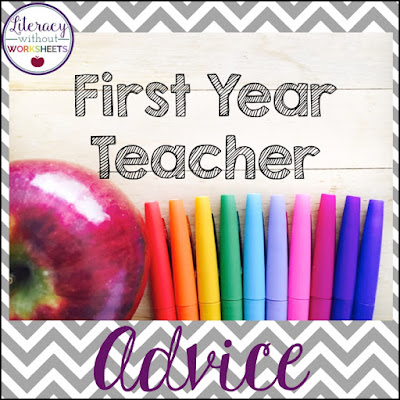I
remember how excited I was when I began teaching 15 years ago! I had my
dream job and I knew was going to make a difference. Twelve years later,
I still work in the same school district, and I still work in a school that has
about 85% students coming from a low-income home. I still have the same excitement and feel
the same way- that I am making a difference!
Not
everyday is perfect and some days are harder than others. You'll meet
lots of people that have lost their "teaching spark" but don't let them bring you down!!!
I'm
a big picture gal, and I know that what I'm doing is going to change these
children's lives and help break the cycle of poverty! I've been
collecting the wisdom of experienced teachers from one year to thirty years
experience! I wanted to share with you some ideas that will help you
survive your first year, help maintain your sanity, and keep you energized and
excited!
Teaching Procedures
Jennifer from the Practical Primary Teacher and Carla from Comprehension Connection both focuses
on classroom routines and procedures.
Jennifer says that it may seem like overkill to model and have kids do
certain things over and over until they get it correct, but it will be worth it
when they can do it automatically. It will save you from chaos and from wasting
valuable instruction time. Remember...wasted seconds and minutes each day can
add up to wasted hours and even DAYS over the period of a school year! Some
examples of things to perfect: Coming to meeting area, lining up, leaving
meeting area, drink and bathroom procedures, getting supplies, turning things
in, going to centers/stations, cleaning up centers/stations, meeting at small
group area.
Carla reminds new teachers to think about about the
traffic flow- (least amount of wandering possible)! If you decide to change
things up in your room, try to make just one change at a time and polish it
before making another. Too many changes at once leads to a stressed teachers
and confused kids.
Here is a checklist you can use to ensure you have taught all the procedures that you feel are most important to your classroom.
Here is a checklist you can use to ensure you have taught all the procedures that you feel are most important to your classroom.
Collaborate
The most frequent advice I was given was to use your fellow
grade level teachers as a resource for questions, guidance, anything you need!
Darcy from Ms. D's Literacy Lab reminds new teachers to become good friends with your literacy coach and reading
teacher. They will be your greatest supports with ideas, websites, knowledge of
your school's literacy closet, understand the language arts curriculum at all
grade levels, and know your students' already !
I love this great suggestion from Janiel Wagstaff: One way to
boost your skills is to observe expert teachers in your own building. Your
literacy coach or admin can facilitate this.
Build Relationships
When it comes to students, Miranda J. reminds new teachers to create a
bond with your students, relationships are everything. They will work and try
hard for those they know care and believe in them.
Take Care of You!
Finally, Shelly T. reminds teachers to get plenty of
sleep!!! You’ll need it! The first few weeks (or more) are going to be very overwhelming and your "to do" list is going to probably cause you lots of anxiety. Make sure you take time to relax and do something that is not school related! You can't pour from an empty cup, so please make sure to fill your cup!


















No comments